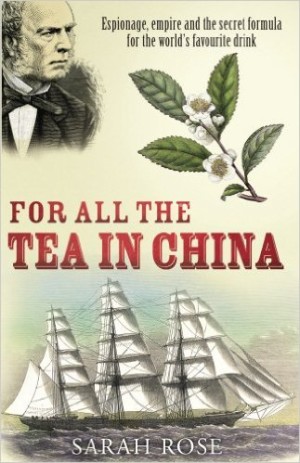This true story has all the hallmarks of a fictional adventure. The backdrop is a fascinating time, not taught in classrooms, when the British were producing opium for sale to the Chinese in order to fund their own addiction: tea. When the opium-tea exchange becomes ever more difficult, the British need to find another option for stability: enter botanist turned spy, Robert Fortune, to steal the plant out of China. Although written for adults, the simple language and linear story-telling makes it suitable for younger readers (13+).
If you know nothing about China and its history, this is a good place to start. Although it is non-fiction, this little known story of blatant daring and ad hoc espionage is an exciting escapade at a time when tea was one of the most valuable commodities in the world.
There was a time when maps of the world were redrawn in the name of plants, when two empires, Britain and China, went to war over two flowers: The poppy and the camellia. […] For nearly two hundred years, the East India Company sold opium to China and bought tea with the proceeds.
However, after years of trade restrictions in China, an increase in demand for tea in Britain and Europe, the outbreak of the first Opium War in 1840, the ever growing reliance on tax from tea imports and the looming possibility of legalising opium in China, Britain was hostage to China’s monopoly of tea production. Something they needed to rectify and quickly: they determined to send in a specialist….a botanist. Not merely just a gardener, botanists at the time were superstars of the day, important because ‘Botanical imperialism was a way of making colonies pay their way, and plant hunters became the research and development of the Empire.’
Furthermore, the emergent botanists were becoming swashbucklers and world-changers.
In this case, the particular ‘swashbuckling’ botanist was Robert Fortune, a respected scientist in his field and someone who had demonstrated some pragmatism in his previous endeavours.
Rose follows Fortune’s attempts to penetrate a part of China closed to all foreigners since Marco Polo, with only the most rudimentary of disguises: ‘All Chinese subjects wore queues, Fortune had one too, therefore he must be a subject of the Emperor.’ The rest is history… as they say.
There are other moments of some amusement. For example, considering the enormity of the task they had set out to Fortune, the missive from the East India House only a week after making their first offer, is almost comical in its sobriety.
The court will also defray all your travelling charges and other expenses which you may incur in India and China in procuring and conveying plants and seeds and in otherwise carrying out the objects contemplated by the Court in view to extend the cultivation of tea in the hill tracts of the North West Provinces of India.
As it is of importance that you should arrive in China as early in the Autumn as possible a passage will be procured for you in one of the Peninsular and Oriental Company’s vessels in order that you may proceed in the most expeditious manner.
East India House 17th May 1848
My only reservation, however, is that this riveting story could have been more gripping than it was and possibly more accurate in the hands of a better editor. Nevertheless, it still makes for an interesting, if undemanding, read for adults, and is a fascinating read for inquisitive young readers interested in history.
Follow-up recommendations for grown-ups:
- The True History of Tea by Victor H Mair and Erling Hoh
- The Book of Tea by Okakura Kakuzō





